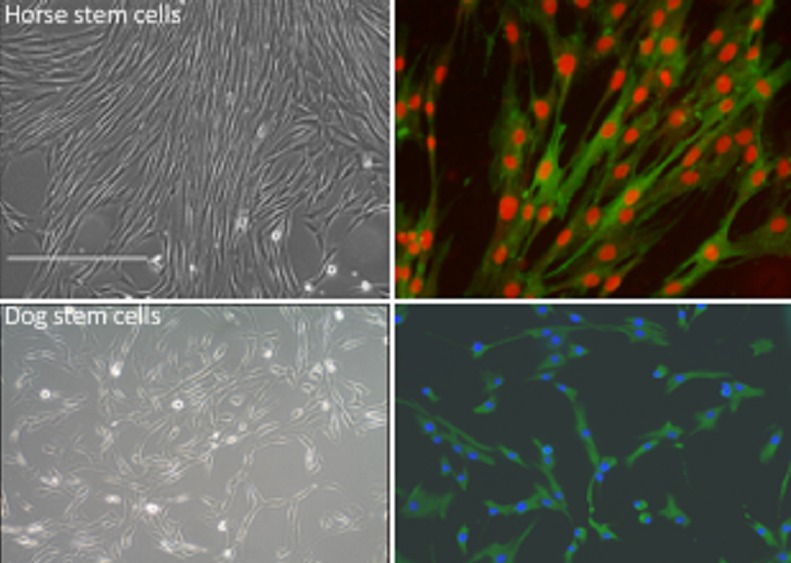Canine and Equine Stem Cell Treatment
Clinical Connections – Summer 2018
The RVC is a registered equine stem cell centre authorised by Veterinary Medicines Directorate (VMD) for the production and processing of equine stem cells for autologous treatment of horses.
The centre uses protocols that were originally developed for clinical use at the RVC by Roger Smith, Professor of Equine Orthopaedics, for the autologous treatment of tendon injuries in the horse. The approach has since been recognised and used globally, with many thousands of horses having benefited from this treatment.
Professor Smith and Dr Jay Dudhia, Senior Lecturer in Matrix Biology, have continued to develop the treatment through their research in regenerative medicine so that new advances can be taken into the clinic, for dogs as well as horses.
A major emphasis of the stem cell centre is to ensure the highest quality is maintained in producing stem cells for the clinic. Although the process of culturing cells is relatively uncomplicated, the understanding of stem cells and maintaining their stem cell qualities, which can impact their efficacy, is much more complex. The experience of the stem cell centre team is critical to this aim. The centre also works with referring vets and owners to answer key questions, such as “When is a patient a good candidate for stem cell treatment?” This discussion enables the best decisions to be made for each animal.

Outlining the canine stem cell service, Dr Dudhia said: “The stem cell centre offers a service for the preparation of mesenchymal stem cells from dog adipose tissue for the autologous treatment of arthritis and tendon and ligament injuries. A sample submission form is dispatched to the clinic together with a validated chill-box in which to return the adipose tissue samples to the lab. The adipose tissue is immediately processed to isolate and expand the stem cells to the desired numbers before shipping the cells by next day courier.
“The time from receiving the sample to dispatch of the cells varies between five days and two weeks, depending on the amount of adipose tissue that is submitted. Stem cell treatment for joint conditions in the dog is sometimes applied more than once, with a second injection of cells usually four to six months after the first injection to support long-term benefit of the stem cells. The centre provides cryostorage of cells for subsequent applications.”
The stem cell centre offers a service for the preparation of mesenchymal stem cells from bone marrow of horses using advanced protocols originally established at the RVC and which have been adopted worldwide for the autologous treatment of tendon and ligament injuries and for arthritis.
The process involved is similar to that for dogs. A sample submission form is dispatched to the clinic together with a validated chill-box in which to return the bone marrow samples to the lab. The bone marrow is immediately processed to isolate and expand the stem cells to the desired numbers before shipping the cells by next day courier. The time from receiving the sample to dispatch of the cells is typically two and a half to three weeks.
The original pioneering work at the RVC used five million stem cells for the treatment of core injuries of the superficial digital flexor tendon. The team’s research into regenerative strategies has continued to improve this technology and it is now recommended to use 20 million cells.
The cost for the isolation, expansion and delivery of both canine and equine stem cells is £700 plus VAT. The cost of subsequent expansion of the cells from cryostorage is £200 (plus VAT) for each expansion requested.
